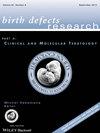下载PDF
{"title":"在美国和加拿大,使用州和省监测项目来降低神经管缺陷复发的风险:一个错失的机会?","authors":"Timothy J. Flood, Chelsea M. Rienks, Alina L. Flores, Cara T. Mai, Barbara K. Frohnert, Rachel E. Rutkowski, Jane A. Evans, Russell S. Kirby","doi":"10.1002/bdra.23576","DOIUrl":null,"url":null,"abstract":"<div>\n \n <section>\n \n <h3> Background</h3>\n \n <p>Once a woman has had a fetus or infant affected with a neural tube defect (NTD), the risk of recurrence is approximately 3%. This risk can be significantly reduced by folic acid supplement consumption during the periconceptional period; however, this requires women at risk to be adequately informed about the appropriate dosage and timing of supplement intake before planning another pregnancy. As birth defects surveillance programs are tasked with identifying and documenting NTD-affected pregnancies and births, they are in a unique position to support recurrence prevention activities.</p>\n </section>\n \n <section>\n \n <h3> Methods</h3>\n \n <p>In 2015, we surveyed state and provincial birth defects surveillance programs to assess their NTD recurrence prevention activities. The online survey was sent to programs in 52 United States (U.S.) jurisdictions and all 13 provinces and territories in Canada. Findings were compared with a similar survey conducted in 2005 among U.S. programs.</p>\n </section>\n \n <section>\n \n <h3> Results</h3>\n \n <p>In 2015, of the 44 U.S. and Canadian surveillance programs that responded, only 9 programs (7 U.S. and 2 Canadian) reported currently having activities specifically directed toward preventing NTD recurrence. Compared with a 2005 survey of U.S. programs, the number of U.S. programs working on NTD recurrence prevention decreased by almost 50% (from 13 to 7 programs).</p>\n </section>\n \n <section>\n \n <h3> Conclusion</h3>\n \n <p>The number of birth defects surveillance programs with NTD recurrence prevention activities has decreased over the past decade due to a range of barriers, most notably a lack of resources. However, while some recurrence prevention activities require part-time staff, other activities could be accomplished using minimal resources. Birth Defects Research (Part A) 106:875–880, 2016.© 2016 Wiley Periodicals, Inc.</p>\n </section>\n </div>","PeriodicalId":8983,"journal":{"name":"Birth defects research. Part A, Clinical and molecular teratology","volume":"106 11","pages":"875-880"},"PeriodicalIF":0.0000,"publicationDate":"2016-11-28","publicationTypes":"Journal Article","fieldsOfStudy":null,"isOpenAccess":false,"openAccessPdf":"https://sci-hub-pdf.com/10.1002/bdra.23576","citationCount":"1","resultStr":"{\"title\":\"Using state and provincial surveillance programs to reduce risk of recurrence of neural tube defects in the United States and Canada: A missed opportunity?\",\"authors\":\"Timothy J. Flood, Chelsea M. Rienks, Alina L. Flores, Cara T. Mai, Barbara K. Frohnert, Rachel E. Rutkowski, Jane A. Evans, Russell S. Kirby\",\"doi\":\"10.1002/bdra.23576\",\"DOIUrl\":null,\"url\":null,\"abstract\":\"<div>\\n \\n <section>\\n \\n <h3> Background</h3>\\n \\n <p>Once a woman has had a fetus or infant affected with a neural tube defect (NTD), the risk of recurrence is approximately 3%. This risk can be significantly reduced by folic acid supplement consumption during the periconceptional period; however, this requires women at risk to be adequately informed about the appropriate dosage and timing of supplement intake before planning another pregnancy. As birth defects surveillance programs are tasked with identifying and documenting NTD-affected pregnancies and births, they are in a unique position to support recurrence prevention activities.</p>\\n </section>\\n \\n <section>\\n \\n <h3> Methods</h3>\\n \\n <p>In 2015, we surveyed state and provincial birth defects surveillance programs to assess their NTD recurrence prevention activities. The online survey was sent to programs in 52 United States (U.S.) jurisdictions and all 13 provinces and territories in Canada. Findings were compared with a similar survey conducted in 2005 among U.S. programs.</p>\\n </section>\\n \\n <section>\\n \\n <h3> Results</h3>\\n \\n <p>In 2015, of the 44 U.S. and Canadian surveillance programs that responded, only 9 programs (7 U.S. and 2 Canadian) reported currently having activities specifically directed toward preventing NTD recurrence. Compared with a 2005 survey of U.S. programs, the number of U.S. programs working on NTD recurrence prevention decreased by almost 50% (from 13 to 7 programs).</p>\\n </section>\\n \\n <section>\\n \\n <h3> Conclusion</h3>\\n \\n <p>The number of birth defects surveillance programs with NTD recurrence prevention activities has decreased over the past decade due to a range of barriers, most notably a lack of resources. However, while some recurrence prevention activities require part-time staff, other activities could be accomplished using minimal resources. Birth Defects Research (Part A) 106:875–880, 2016.© 2016 Wiley Periodicals, Inc.</p>\\n </section>\\n </div>\",\"PeriodicalId\":8983,\"journal\":{\"name\":\"Birth defects research. Part A, Clinical and molecular teratology\",\"volume\":\"106 11\",\"pages\":\"875-880\"},\"PeriodicalIF\":0.0000,\"publicationDate\":\"2016-11-28\",\"publicationTypes\":\"Journal Article\",\"fieldsOfStudy\":null,\"isOpenAccess\":false,\"openAccessPdf\":\"https://sci-hub-pdf.com/10.1002/bdra.23576\",\"citationCount\":\"1\",\"resultStr\":null,\"platform\":\"Semanticscholar\",\"paperid\":null,\"PeriodicalName\":\"Birth defects research. Part A, Clinical and molecular teratology\",\"FirstCategoryId\":\"1085\",\"ListUrlMain\":\"https://onlinelibrary.wiley.com/doi/10.1002/bdra.23576\",\"RegionNum\":0,\"RegionCategory\":null,\"ArticlePicture\":[],\"TitleCN\":null,\"AbstractTextCN\":null,\"PMCID\":null,\"EPubDate\":\"\",\"PubModel\":\"\",\"JCR\":\"Q\",\"JCRName\":\"Medicine\",\"Score\":null,\"Total\":0}","platform":"Semanticscholar","paperid":null,"PeriodicalName":"Birth defects research. Part A, Clinical and molecular teratology","FirstCategoryId":"1085","ListUrlMain":"https://onlinelibrary.wiley.com/doi/10.1002/bdra.23576","RegionNum":0,"RegionCategory":null,"ArticlePicture":[],"TitleCN":null,"AbstractTextCN":null,"PMCID":null,"EPubDate":"","PubModel":"","JCR":"Q","JCRName":"Medicine","Score":null,"Total":0}
引用次数: 1
引用
批量引用


